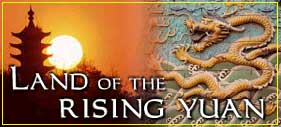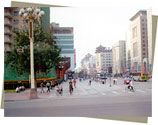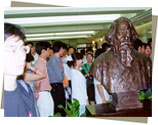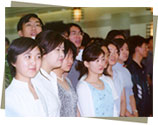
|
HOME |
NEWS |
REDIFF DIARY
|
Nikhil Lakshman |

For many Indians, America is the closest approximation of Paradise, the country they must visit sometime in their lives. I have never been that fascinated by the US of A. Since I was a child I have been more intrigued by our biggest neighbour. So when Rashtrapati Bhavan invited rediff.com to join the media delegation accompanying President K R Narayanan on his visit to China last month, I abandoned my usual abstinence from government excursions and put in my name for a passage to the Middle Kingdom. Nothing that you read about China, none of the photographs that appear in international magazines prepares you for Beijing, the first blip on the Presidential itinerary. Where are the rickshaws you remember Peking by? Where are the grim men in Mao suits? Where the grannies at street corners surveying the world as it passes by, reporting events and personalities to Chinese intelligence? Ramananda Sengupta from Outlook magazine and I began keeping a tally of the old people we came across -- after three days in Beijing, we had only spotted half-a-dozen such people. Most of the faces on the pavements, in the crowded buses, in the flea markets, were earnest and young. To a man and woman, they were smartly dressed in Western clothes. Many young women asserting their attractive and slim (for a nation of rice-eaters, most Chinese women are reed-thin) figures via fashionable shorts, skirts and trousers. Another misconception: One had heard of how the Chinese State forbade public expressions of affection. But on Beijing's sidewalks, on the grassy atolls adjoining the streets, men and women held hands, hugged and necked, oblivious, as lovers the world around are, to scrutiny.
The Chinese are clearly obsessed with order -- and any deviation from the routine can be met by bewilderment. The reception staff at my hotel were stunned when one Chinese guest threw a tantrum. The man banged the desk and threw his bills about. The poor things had no clue about dealing with him. It was as if no one had prepared them for such a possibility. Beijing has many fine hotels -- one consular official informed us that the Chinese capital has 500 five-star hotels. Delhi, in comparison, has only about 10! The department stores flanking many hotels are stocked with expensive Western brands. And while the prices sent many of us scurrying for cover, one spotted throngs of middle class Chinese picking up the wares. Shopping in Chinese bazaars meant trading by calculator. Hit a shop, point to merchandise you like and ask for the calculator. How much, you gesticulate. Whereupon the shopkeeper hits some absurd sum on his calculator. You respond with a figure about 1/100ths the asking price. Buyer and seller then embark on an animated process of negotiation that usually ends in the Indian walking out of the shop with the goods at far less than what the Chinese had asked for. Perhaps there is a message in this for the external affairs mandarins trying to negotiate a solution to the long-festering border dispute. Though the shopkeepers don't speak English, almost 60 per cent of trading establishments in Beijing -- and a slightly smaller number in Dalian and Kunming, the other two cities we visited -- had dual language name boards, in Chinese and in English. Perhaps this was a tribute to the hordes of international tourists (Americans, Australians, Japanese, Malaysians...) who now converge on China.
Even though the familiar television acronyms -- BBC, CNN, CNBC, MTV -- are forbidden fare in Chinese homes, Western culture is predictably popular. At Chinese nightclubs, 20somethings danced away to Western pop, not Chinese hits. Many young women mouthed "I love yous" to anyone who glanced in their direction, and any acknowledgement of their presence invited the promise of various sexual offers, for a price of course (approximately Rs 10,000 for a romp, we heard). One colleague, who decided to further investigate this ugly aspect of modern Chinese life, discovered that the women were university students at day and purveyors of carnality at night. Though taking a Chinese woman to your room and having sex is an offence, presumably there are enough men tantalised by the prospect of an Oriental encounter to take the risk. Or maybe five-star hotels are exempt from the probing tentacles of the Chinese Public Security Bureau. Unlike Delhi's policemen who will not allow journalists to take their tools of trade into the precincts of power, Chinese security personnel had no objections to cameras, mobiles and tape recorders being ferried into their hallowed Great Hall of the People. Despite this almost casual approach, one diplomat told us that Chinese security is ruthlessly efficient, unobtrusive but omnipresent. Potential threats to the system are quickly identified and incarcerated. Which is why many were stunned by the gherao sometime ago of the quarter where the Chinese leadership lives by members of the Falun Dafa group. Best known for its Falun Gong exercises, the Falun Dafa are currently persona non grata in China and have provoked a crackdown not only on the sect, but on other religions as well. One reason why Chinese security cannot easily isolate Falun Dafa members, one China hand told us, is because the latter use email and mobile phones to keep in touch with each other. This, Big Brother finds increasingly difficult to intercept or monitor. Buddhism remains the dominant religion in China -- a fact that some believe accounts for the goodwill among common Chinese towards India -- but China hands tell us Christianity is now the preferred faith among the young. Another instance, we guess, of the attractions of a Western way of life. Even though corruption is common in China, economic offences -- not crimes like murder and rape -- are the single biggest reason for executions. China leads the world in the death penalty, and it is common to read about provincial officials being shot for milking the State in the newspapers. Not that these executions have frightened those anxious to make some extra cash. "It is in-built into the system," one China hand told us. "You sign a contract with a Western company. It is understood that 'x' number of your people will be sent abroad for training for six months. Each is to be paid a daily allowance of say $200. Of these 'x' people, almost 90 per cent are useless, but you cannot get rid of them. Moreover, each of them has made a hefty amount in foreign exchange during his stay overseas. MNCs factor these costs in their projections when they decide to invest in China." Of course, those close to the men who rule China are usually exempt from execution or prison. Once their crimes are detected, their betrayed benefactors usually move their tainted proteges to the Chinese version of Coventry. They are deprived of power and privilege, but live to presumably enjoy their ill-earned wealth.
We visited China a week before the 11th anniversary of the Tienenamen Square uprising. Could it happen again, we asked a diplomat well into his second tour of the country.
"At the moment," he said, "things are going well for the Chinese leadership. There is enormous prosperity. The young people are too caught up with doing well at university so that they can go abroad for further studies." "But who can tell? Some days before President Narayanan arrived at Peking University, 3,000 students demonstrated to protest against the rape and murder of a student who travelled from the suburbs. It was a spontaneous protest that compelled the university authorities, which had till then ignored the incident, to take up the issue with the government. "True, these students are currently too consumed by Western-style consumerism," he continued. "But who can tell when they will begin demanding democracy and greater freedom as well? Can the Chinese leadership quell them as they did at Tienanmen in June 1989?"
Though Indian journalists find it difficult to obtain Chinese visa, Nikhil Lakshman hopes to visit the Middle Kingdom again, soon.
|
||
|
HOME |
NEWS |
BUSINESS |
MONEY |
SPORTS |
MOVIES |
CHAT |
INFOTECH |
TRAVEL SINGLES | NEWSLINKS | BOOK SHOP | MUSIC SHOP | GIFT SHOP | HOTEL BOOKINGS AIR/RAIL | WEATHER | MILLENNIUM | BROADBAND | E-CARDS | EDUCATION HOMEPAGES | FREE EMAIL | CONTESTS | FEEDBACK |
||
 About 12 million people live in Beijing, but the buzz and din you normally associate with a city of its size is absent. Even when large clusters of people marched towards their destinations, there is no accompanying cacophony of the sort you hear in Indian cities, only barely heard Chinese whispers.
About 12 million people live in Beijing, but the buzz and din you normally associate with a city of its size is absent. Even when large clusters of people marched towards their destinations, there is no accompanying cacophony of the sort you hear in Indian cities, only barely heard Chinese whispers.
 The staff at hotels and restaurants had nameplates with Chinese and 'English' names (Angela Wu, for instance). As one China watcher at the MEA told us, "The Chinese know the value of English. They realise that not knowing English is a disadvantage they would like to erase quickly. By the next generation, they should catch up with us."
The staff at hotels and restaurants had nameplates with Chinese and 'English' names (Angela Wu, for instance). As one China watcher at the MEA told us, "The Chinese know the value of English. They realise that not knowing English is a disadvantage they would like to erase quickly. By the next generation, they should catch up with us."
